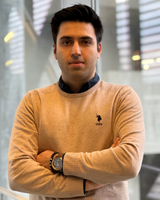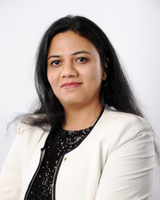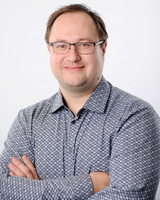In January 2022, the Stem Cell Network (SCN) and Mitacs partnered to offer industry-based internships in the regenerative medicine (RM) sector. Four applicants were successful and are now interning with RM-focused biotech companies that are moving innovative therapies and technologies into the marketplace. SCN had the opportunity to speak with the four interns about their career paths, internship projects and future career goals.
 Hossein Golzar
Hossein Golzar
Company Match: Allarta Life Science
From childhood Hossein knew he wanted to make the world a better place to live. He pursued this passion during his undergraduate degree in Chemical Engineering, where he conducted research on producing biodegradable and starch-based bioplastics. By the end of this degree, he knew he wanted to pursue a long-term career in nanobiotechnology research to impact human life today, and in the future. He completed a master’s in biotechnology, a subfield of Chemical Engineering, and began a PhD in Chemistry at the University of Waterloo (UW).
“Since beginning my studies at UW, translating research into novel therapies has become my final goal,” said Hossein. “I believe it is possible to move from current high-risk surgery to a new class of personalized treatment using biomaterials along with 3D printers to make functional 3D constructs for a wide variety of biomedical applications, particularly for cell and gene therapy and tissue engineering purposes”.
Hossein is interning at Allarta Life Science where his work focuses on hydrogels for biomedical applications. Hydrogels can be used to support and protect therapeutic cells, including cells that are producing insulin. Allarta develops new hydrogels that are compatible with a number of different therapeutic cells. Hossein’s project will focus on preparing these hydrogels and testing their mechanical and physical properties, as well as their ability to support different cells, with the ultimate goal of working towards a successful cell therapy for diabetes.
“Here, at Allarta, I have the opportunity to work with a group of talented researchers to develop new hydrogel-based materials for cell therapies for patients suffering from, for example, type 1 diabetes,” said Hossein. “The SCN-Mitacs internship program is allowing me to gain the necessary expertise to pursue my passions. I want to make a profound impact on human health and allow people to live longer, healthier lives.”
After completing his Ph.D., Hossein plans to become an entrepreneur focused on developing new treatment methods to tackle some of the world’s most pressing health challenges, including cancer and organ failure.
 Ruchi Sharma
Ruchi Sharma
Company Match: Axolotl Biosciences
Ruchi is a postdoctoral fellow in Mechanical Engineering. She has a broad background in tissue engineering and expertise in 3D bioprinting of neural tissues with the intended purpose of developing cell therapies and drug screening applications. Her research is fueled by her passion to develop better therapies for Parkinson’s disease (PD), a progressive, neurodegenerative disorder affecting roughly 1 in 500 Canadians. Because PD does not occur in animals, treatments that work in animal models have a poor record of being translated successfully to human patients.
“My research focuses on neural tissue engineering and regenerative medicine using biomaterials, stem cells, and drug delivery systems,” said Ruchi. “The objective of my research is to bioprint human stem cell-derived neural cells along with drug delivery systems to produce human neural tissues that can potentially be used in therapies for disorders of the central nervous system.”
Ruchi is interning at Axolotl Biosciences where she will bring her training and expertise in bioprinting to develop HeartPrint – a novel bioink for generating human cardiac (heart) tissue models for drug testing. Cardiovascular disease is one of the world’s leading causes of mortality. However, due to a scarcity of heart donors, new cardiac regenerative medicine sources are desperately needed. The increasing use of biomaterials in tissue engineering has created a direct and promising platform; however, technical advancements are needed to create a heart structure with complete biological function. Ruchi is currently conducting preliminary research on previous studies in a field related to the development of heart bioink and its physical and mechanical characteristics.
“3D bioprinting inspires me because it can help develop customized treatments based on the individual patient,” said Ruchi. “The bioink used for printing needs to be highly biocompatible to allow live cells to be printed, mechanically stable after printing, and provide high resolution during printing. The SCN-Mitacs internship will allow me to further investigate this novel approach, which has the potential to have a broad impact on society by improving human lives and strengthening Canada’s position as a world leader in health innovation.”
Ruchi is the vice president of the BC Chapter of the Canadian Biomaterial Society. Her long-term career goal is to become an expert in biomaterials development, drug delivery, and 3D bioprinting, with the ability to print a wide variety of human tissues. She wants to make a difference in the world by saving lives and enabling others to live longer and healthier lives.
 Marek Budzynski
Marek Budzynski
Company Match: Aspect Biosystems
Marek is a postdoctoral fellow (PDF) with over 12 years of laboratory experience from Poland, Finland, and more recently, Canada. He completed his Ph.D. in Cellular and Molecular Biology and his thesis focused on how the cellular response to protein-damaging stresses is regulated. Marek is motivated by the thrill of discovery and the need to make the world a better place.
“My postdoctoral project focuses on understanding how transcriptional programs [the process by which a cell makes proteins based on a DNA template] are carried over through cell division in stem cells and how certain proteins facilitate that process,” said Marek. “My PDF has afforded me the opportunity to gain hands-on-training with stem cells and to master cutting edge techniques for profiling DNA-protein interactions.”
Marek is interning at Aspect Biosystems. His project aims to engineer a reporter cell line that will monitor and report the degree of metabolic stress that cells may experience in Aspects’s bioprinted tissues therapeutics post-implantation. Cell-based therapies have the potential to revolutionize the treatment of chronic diseases, including cancer, autoimmune disorders, and metabolic disorders (e.g., diabetes and liver disease). A reliable reporter cell line will help understand the function of living cells within different designs and compositions of bioprinted tissues implanted into different sites within the body.
“The SCN-Mitacs internship is providing me the unique opportunity to gain insights into the fast-paced industrial research environment”, said Marek. “I will receive mentorship from senior leaders at Aspect Biosystems to enable me to become a better scientist, leader, and mentor.”
Marek looks forward to expanding his network throughout the course of his internship to gain further insights into career choices for individuals with his expertise. His long-term career goal is to land a job in industry where he feels he will have the best opportunity to directly impact society.
 Jamie Beaulieu
Jamie Beaulieu
Company Match: BlueRock Therapeutics
Jamie is a first year Ph.D. student in Dr. David Knapp’s cell engineering lab at the Institute for Research in Immunology and Cancer (IRIC). He holds a B.Sc. Honours in Cell and Molecular Biology, an M.Sc. in Neuroscience and is currently completing a part-time certificate in the Life Sciences Entrepreneurship Development Program at the John Molson School of Business for which he received a full scholarship. His research areas of interest are stem cell biology, genome engineering and machine learning.
“During my master’s degree, I decided to continue working part-time in Dr. Knapp’s lab at Université de Montréal, where my work was focused on developing synthetic DNA circuits to better study cell fate,” said Jamie. “Since many of my tools were also being used by labmates to collaborators, I started to focus more on the end-user during my design process. I wanted to make sure I was building something that people would actually want to work with. Due to the inherit nature of academia, this mindset isn’t often put forward. For me, it’s what sparked my interest for translational research in the field of regenerative medicine and has pushed me to investigate different opportunities for merging both industry and academia, with a goal of bringing cheaper drugs and treatments to all Canadians.”
Jamie is interning at BlueRock Therapeutics Canada ULC. He will be engaged in work to optimize the production of high-quality induced pluripotent stem cells (iPSCs) from blood cells. The attractiveness of iPSC-based cell therapies in regenerative medicine is based on their limitless ability to self-renew and become virtually any cell type. BlueRock is advancing and defining manufacturing processes necessary to manufacture iPSCs on a large scale to provide clinical and commercial product to healthcare professionals and patients. Jamie’s project will help advance iPSC manufacturing technology with work on standardizing the process and improving the production of high-quality iPSCs from blood cells, ultimately allowing iPSC-based therapies to reach more patients.
“Research is on-going to further ensure the safety and efficacy of iPSC-based therapies and to scale up their manufacturing efficiently and effectively,” said Jamie. “Solving these issues will be critical in bringing the next-generation medicines to the clinic. Through this internship, I hope to be a part of advancing the therapeutic pipeline at BlueRock, as well as experience the biotech industry culture, learn about risk assessment, project management, process development, manufacturing, and quality control. I’m really excited to work with such a vibrant community of scientists.”
Jamie looks forward to establishing meaningful connections with industry contacts, expanding his network and gaining insights into industry management. He intends to develop new marketable technologies for the field of regenerative medicine while completing his Ph.D. and is focused on translating his current project into a spinoff biotech company in the future.

